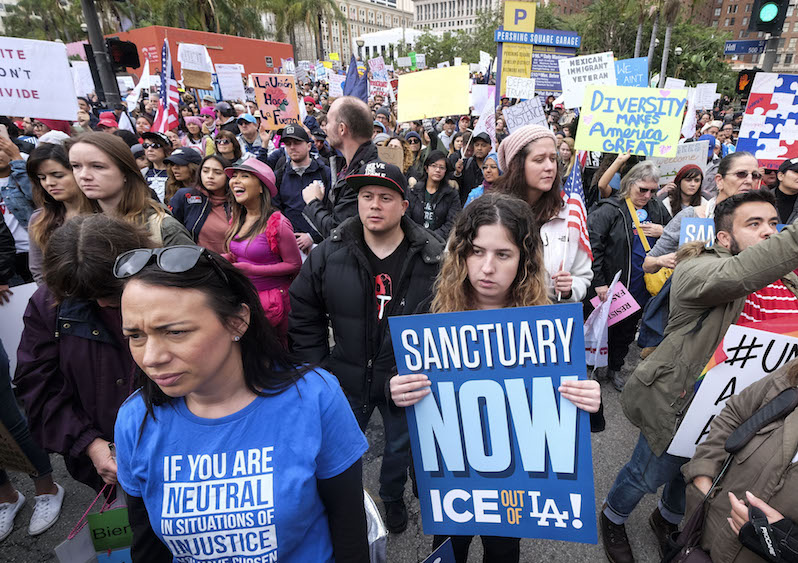A New, Progressive Form of Federalism Is Spreading With the GOP in Control
To derail Donald Trump’s domestic agenda, the left is bolstering the autonomy of states and cities to protect minorities, the poor, the undocumented and our ecosystems. Protesters in February's Free the People Immigration March in Los Angeles. L.A. city officials and residents have been leaders in the anti-Trump resistance movement. (Ringo H.W. Chiu / AP)
1
2
Protesters in February's Free the People Immigration March in Los Angeles. L.A. city officials and residents have been leaders in the anti-Trump resistance movement. (Ringo H.W. Chiu / AP)
1
2
According to Sessions, the crackdown is necessary because of an immigrant crime wave. “[W]hen cities and states refuse to help enforce immigration laws,” he said in his announcement, “our nation is less safe. Failure to deport aliens who are convicted for criminal offenses puts whole communities at risk—especially immigrant communities in the very sanctuary jurisdictions that seek to protect the perpetrators.
“DUIs, assaults, burglaries, drug crimes, gang crimes, rapes, crimes against children and murders. Countless Americans would be alive today—and countless loved ones would not be grieving today—if the policies of these sanctuary jurisdictions were ended.”
The facts, of course, are contrary. As several recent studies have shown, immigrants commit significantly fewer crimes per capita than their native-born counterparts. Nor is there any truth to the claim that crime rates in sanctuary cities are higher than elsewhere.
Sessions’ plans to withhold federal funds also rest on shaky legal grounds, and several sanctuary jurisdictions have filed federal suits to block the implementation of Trump’s executive order.
The first city to take legal action was San Francisco, which lodged its case in January. In its action, San Francisco contends that the EO violates both the 10th Amendment and the “Spending Clause” of Article I, Section 8, of the Constitution, which vests Congress, not the executive branch, with the power to tax and spend, and on that basis withhold federal monies.
The city also argues that ICE’s detainer policies violate the Fourth Amendment’s prohibition against unreasonable searches and seizures, because detainers are not criminal warrants issued by judges and supported by findings of probable cause to believe that detainees have committed federal criminal offenses. Rather, they are, in the legal sense, “civil” requests that individuals be held in criminal custody beyond the jail time they have already served for violating state criminal law.
San Francisco, along with other sanctuary jurisdictions, claims that it has no objections to honoring federal arrest warrants, but that ICE detainers place unreasonable stress on local law-enforcement budgets. Sanctuary jurisdictions also contend that deputizing local police and correction facilities to act effectively as ICE agents deters undocumented populations from cooperating with police in reporting serious crime and instances of domestic abuse.
Sanctuary litigation in general is in its formative stages. However, in a related decision dealing with an ICE detainer placed on a Haitian immigrant jailed in Miami for a traffic offense that was handed down in early March, Circuit Court Judge Milton Hirsch ruled that both the 10th Amendment and the Spending Clause blocked enforcement of EO 13,768. He ordered the Haitian released.
Hirsch, a former president of the Florida Association of Criminal Defense Lawyers and a prominent critic of the state’s death-penalty procedures, reached his conclusion on the 10th Amendment by relying primarily on the late Justice Antonin Scalia’s 1997 5-4 majority opinion in Printz v. United States.
Widely considered a paean to federalism, Printz struck down a provision of the Brady Handgun Violence Prevention Act that required local police departments to perform background checks on gun buyers. “Congress cannot compel the States to enact or enforce a federal regulatory program,” Scalia held. “The Federal Government may neither issue directives requiring the States to address particular problems, nor command the States’ officers, or those of their political subdivisions, to administer or enforce a federal regulatory program. It matters not whether policymaking is involved, and no case-by-case weighing of the burdens or benefits is necessary; such commands are fundamentally incompatible with our constitutional system of dual sovereignty.”
On the Spending Clause issue, Hirsch relied on a series of other pro-federalist Supreme Court precedents that, taken together, instruct that while Congress may attach conditions to the receipt of federal funds to a certain degree, it cannot do so in such a way as to bring about “otherwise-unconstitutional outcomes,” or in a coercive manner that threatens “to press-gang” or “commandeer” local personnel into federal service under the penalty of a loss of federal funding.
The “anti-commandeering” limitations of the Spending Clause were recently reaffirmed by the Supreme Court in its 2012 decision, striking down the Affordable Care Act’s mandatory Medicaid expansion provisions. Writing for another slender 5-4 majority, Chief Justice John Roberts described the ACA’s plan to deny all Medicaid funding to states that rejected the expansion as an unconstitutional “gun to the head.” Some budget experts estimated that the complete loss of Medicaid funding would comprise more than 10 percent of some state coffers. The loss of all federal funding to sanctuary cities would amount to an even greater deficit.
Hirsch’s ruling is under appeal.
It remains to be seen how the Supreme Court will rule on Trump and Sessions’ sanctuary funding threats should Hirsch’s decision, or other sanctuary cases, get there. With the addition of Neil Gorsuch, the high court now has a full complement of nine members. Gorsuch is a self-professed admirer of Scalia and a dedicated federalist. But then, we are all federalists now.
Your support matters…
SUPPORT TRUTHDIG
Independent journalism is under threat and overshadowed by heavily funded mainstream media.
You can help level the playing field. Become a member.
Your tax-deductible contribution keeps us digging beneath the headlines to give you thought-provoking, investigative reporting and analysis that unearths what's really happening- without compromise.
Give today to support our courageous, independent journalists.





You need to be a supporter to comment.
There are currently no responses to this article.
Be the first to respond.